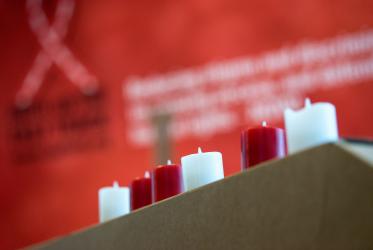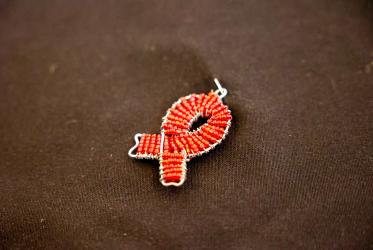Gathered in Kigali, Rwanda on 25-29 September, religious leaders from a variety of faith communities in French-speaking Africa have explored the issue of ”faith-healing only” practices, where some faith communities encourage people living with HIV to stop taking their anti-retroviral medication, claiming they can be healed by faith alone – a rationale devastating for work to overcome HIV and AIDS.
Convened by the World Council of Churches Ecumenical HIV and AIDS Initiatives and Advocacy (WCC-EHAIA) and UNAIDS for a ”Regional Consultation on HIV Treatment Adherence and Faith Healing in Africa”, the focus has been on developing strategies for securing that faith communities can offer healing while still advocating for HIV treatment adherence.
Building momentum
The Kigali consultation takes place as part of the two-year PEPFAR-UNAIDS Faith Initiative, and follows a consultation on the same topic held in Kampala, Uganda, on 4-8 September.
Sara Test, deputy coordinator at the US President's Emergency Plan for AIDS Relief (PEPFAR), explains, ”PEPFAR and UNAIDS support faith-based organizations and work with them to make sure that the response to HIV is sustainable. We support their work in the communities, to make sure they are able to give factual information, as we know that in the context of HIV, treatment is prevention.”
Julienne Munyaneza, consultant with the PEPFAR-UNAIDS Faith Initiative, reflects, “Africa is a big continent and it goes without saying that sub-regions have different historical backgrounds. The Kampala consultation was important and came up with recommendations appropriate for Anglophone countries, but these may not be duplicable in Francophone Africa. Hence the importance of this consultation in Kigali, to address the same topic but in context.”
“We need effective programmes that will address the needs regarding faith-healing that emerge from this consultation,” says Hendrew Lusey, WCC-EHAIA regional coordinator for Central Africa, ”such as strategies that will empower women, girls, men and boys. This consultation has built bridges between religious leaders, health professionals and other stakeholders working in the field of HIV.”
Rev. Dr Nyambura Njoroge, WCC-EHAIA coordinator, continues, "both the consultations in Kampala and here in Kigali have demonstrated an urgent need to listen and learn from people living with HIV, including young people born HIV-positive, regarding their experiences of self- and social stigma, the fear of stigma and discrimination in faith communities, and the in-depth meaning of faith healing in the absence of a cure for HIV.”
“Testimonies in both consultations show that people living with HIV experience greater health benefits when they have received faith healing as well as anti-retroviral treatment,” adds Rev. Pauline Wanjiru Njiru, eastern Africa regional coordinator for the WCC-EHAIA. ”This has opened our eyes to new avenues on something that has been hidden for so long. It is an opportunity created for people living with HIV to disclose their HIV status and still feel that they are loved and welcome in their community.”
Strategic steps in moving forward
“I am happy to see that the Kigali consultation has brought some high-calibre participants from Burundi, the Democratic Republic of the Congo, and Rwanda,” says Julienne Munyaneza. “But at the same time, one consultation is like a drop in the ocean. This is a big issue and should be taken up at country or even community level.”
“In moving forward, we need to support theological study and bible training schools so that future pastors enter into service equipped to address the problem of “faith-healing only”, Munyaneza concludes. “We know that stigma and discrimination remain a core problem in responding to HIV and it needs to be addressed in all our activities. And we need to do more in involving "revival churches" into our dialogue and reflection, as these tend to be the main promoters of “faith-healing only”.
“Fundamentally”, concludes Bishop Godson Lawson from Togo, chairperson of the WCC-EHAIA International Reference Group, “what we believe is that it is God who has given the human being its intelligence, and that it is this human intelligence that has brought forward anti-retroviral medication. In order to heal, a person living with HIV must both pray and take their medication. Being healed does not necessarily mean that the virus is no longer present in your body, but it gives you the freedom to make choices about what you want to do in life.”
Four voices, one concern – Addressing “faith-healing only” in context of HIV (WCC press release of 7 September 2017)
“Facing the storm of HIV, we can move together, be agents of change” (WCC press release of 6 September 2017)
WCC Ecumenical HIV and AIDS Initiatives and Advocacy (EHAIA)








